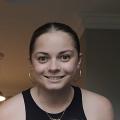
A campaign to name a new polar research vessel after a terminally ill Thetford toddler is now in second place behind the well-publicised Boaty McBoatface suggestion.

Poppy-Mai Barnard was diagnosed with incurable malignant rhabdoid cancer two weeks ago, with the disease spreading to her kidney, lungs and brain and has only weeks to live.
Well-wishers have organised a raft of fund-raising and remembrance events, including creating car stickers, putting on a charity football match and now a new boat could be named after the toddler.
Poppy-Mai's name has been submitted to the Natural Environment Research Council (NERC), and so far more than 14,000 people have voted for the new polar research vessel to be named 'RRS Poppy-Mai' after the 16-month-old. This has put her in second place behind Boaty McBoatface, with that suggestion receiving over 100,000 votes.
A spokesperson from the NERC said of the campaign: 'We have been overwhelmed by the public response to our call for ideas for names, and by the thoughtfulness of the suggestions.
'A panel will consider the suggestions and ultimately, the chosen name will be the one that best fits the criteria. Our thoughts from NERC for Poppy-Mai and her family.'
Parents, Andy, 31, and Sammi Barnard, 29, brought the 16-month-old back to her Thetford home last week, with doctors telling them she did not have long to live.
Mr Barnard said the diagnosis had stunned the family – which includes Poppy-Mai's brothers Rylee, six, and Jenson-Jay, four – and described the pain of seeing his daughter go through the illness.
'She was teething and was struggling compared to her brothers, so we thought that was the problem.
'The doctors thought the same thing.
'But Sammi knew something was wrong and went to A&E, where she was diagnosed. I had been in America working at the time and asked to come home early.
'I've been distraught watching her disappear in front of my eyes, because that's what cancer does.
'We brought her home because we'd rather she enjoyed her last moments at home in an environment she thrived in, rather than surrounded by tubes and machines in a hospital,' he said.
A deluge of calls from friends and family followed the diagnosis, prompting Mr Barnard to share Poppy-Mai's story on a Facebook page.
That page has garnered more than 25,000 members since, and sparked floods of support from around the world, with messages pouring into the page.



Comments: Our rules
We want our comments to be a lively and valuable part of our community - a place where readers can debate and engage with the most important local issues. The ability to comment on our stories is a privilege, not a right, however, and that privilege may be withdrawn if it is abused or misused.
Please report any comments that break our rules.
Read the rules here